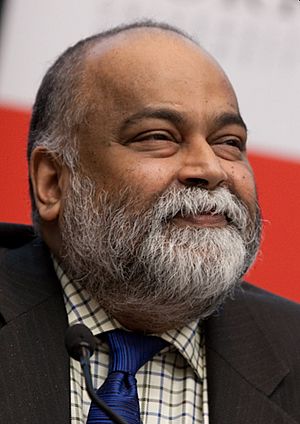Arjun Appadurai facts for kids
Quick facts for kids
Arjun Appadurai
|
|
|---|---|

Appadurai during a lecture in March 2009
|
|
| Born | 4 February 1949 |
| Education | Brandeis University (B.A.) University of Chicago (M.A., Ph.D.) |
| Scientific career | |
| Fields | Anthropology |
| Institutions | New York University The New School University of Pennsylvania |
Arjun Appadurai is an Indian-American anthropologist. An anthropologist is a scientist who studies human societies and cultures. He is known for his ideas about how the world is becoming more connected, a process called globalization.
Appadurai has taught at many universities. These include the University of Chicago, Yale University, The New School, and New York University. He is currently a professor emeritus at New York University. This means he is a retired professor who still keeps his title.
Some of his important books are Worship and Conflict under Colonial Rule (1981) and Modernity at Large (1996). He also wrote Fear of Small Numbers (2006). In 1997, he became a member of the American Academy of Arts and Sciences.
Contents
Arjun Appadurai's Early Life and Schooling
Arjun Appadurai was born on February 4, 1949. His family was Tamil, and they lived in what is now Mumbai, India. He went to high school in Mumbai. Then he studied at Elphinstone College there.
Later, he moved to the United States. He earned his first degree from Brandeis University in 1970. He continued his studies at the University of Chicago. There, he earned his master's degree in 1973 and his Ph.D. in 1976.
Appadurai's Career in Academia
Arjun Appadurai has had a long career teaching and leading at universities. He has shared his knowledge about cultures and societies.
Teaching at the University of Pennsylvania
For many years, Appadurai taught at the University of Pennsylvania. He worked in departments that studied anthropology and South Asia. In 1984, he organized a special meeting there. This meeting led to a book called The Social Life of Things (1986). In this book, he talked about how objects have social and political meaning, not just economic value.
Time at The New School
In 2004, Appadurai became the Provost of The New School. A provost is a senior leader who helps manage the academic side of a university. He later left this role in 2006. He continued to teach there as a distinguished professor.
Working at New York University
In 2008, Appadurai joined New York University (NYU). He became a professor of Media, Culture, and Communication. He retired from this position in 2021. He is now a professor emeritus at NYU.
Other Academic Roles
In 2021, Appadurai also became a professor at the Bard Graduate Center. He teaches from Berlin, Germany. He has also been a visiting scholar at other important places. These include Stanford University and Princeton University.
Appadurai's Important Ideas
Arjun Appadurai is well-known for his ideas about globalization. He believes that the world's cultures are connected in complex ways.
Understanding Globalization: Five "Scapes"
In his famous work, Disjuncture and Difference in the Global Cultural Economy, Appadurai explains his theory of "disjuncture." He says that the global cultural economy is a complex system. It has different parts that are connected but also separate. He describes five main "scapes" or flows that shape our world:
- Ethnoscapes: These are people moving across countries and cultures. Think of immigrants or tourists.
- Mediascapes: This refers to all the different types of media. It includes TV, movies, and the internet. They shape how we see the world.
- Technoscapes: This is about how technology moves around the world. It includes machines and information technology.
- Financescapes: This describes the flow of money and investments globally.
- Ideoscapes: These are the ideas and beliefs that spread across the world.
The Social Imaginary
Appadurai also talks about the "social imaginary." This is how people imagine their social lives. It includes their dreams, hopes, and fears. He believes that imagination is a powerful social force. It helps shape how people act and how societies change.
He explains that imagination is not just a fantasy. It is a real social practice. It helps people connect with global possibilities. This idea builds on the work of other thinkers. One important person is Benedict Anderson. He wrote about "imagined communities."
See also
 In Spanish: Arjun Appadurai para niños
In Spanish: Arjun Appadurai para niños
- Commodity Pathway Diversion
 | DeHart Hubbard |
 | Wilma Rudolph |
 | Jesse Owens |
 | Jackie Joyner-Kersee |
 | Major Taylor |

